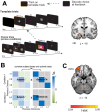Neural mechanisms of credit assignment for delayed outcomes during contingent learning
- PMID: 40231604
- PMCID: PMC11999693
- DOI: 10.7554/eLife.101841
Neural mechanisms of credit assignment for delayed outcomes during contingent learning
Abstract
Adaptive behavior in complex environments critically relies on the ability to appropriately link specific choices or actions to their outcomes. However, the neural mechanisms that support the ability to credit only those past choices believed to have caused the observed outcomes remain unclear. Here, we leverage multivariate pattern analyses of functional magnetic resonance imaging (fMRI) data and an adaptive learning task to shed light on the underlying neural mechanisms of such specific credit assignment. We find that the lateral orbitofrontal cortex (lOFC) and hippocampus (HC) code for the causal choice identity when credit needs to be assigned for choices that are separated from outcomes by a long delay, even when this delayed transition is punctuated by interim decisions. Further, we show when interim decisions must be made, learning is additionally supported by lateral frontopolar cortex (lFPC). Our results indicate that lFPC holds previous causal choices in a 'pending' state until a relevant outcome is observed, and the fidelity of these representations predicts the fidelity of subsequent causal choice representations in lOFC and HC during credit assignment. Together, these results highlight the importance of the timely reinstatement of specific causes in lOFC and HC in learning choice-outcome relationships when delays and choices intervene, a critical component of real-world learning and decision making.
Keywords: Learning; credit assignment; frontal-pole; hippocampus; human; neuroscience; orbitofrontal cortex.
Conflict of interest statement
PW, LR, ZK, MG, RD, EB No competing interests declared, TB Editor-in-Chief, eLife
Figures













Update of
-
Neural mechanisms of credit assignment for delayed outcomes during contingent learning.bioRxiv [Preprint]. 2024 Dec 12:2024.08.06.606895. doi: 10.1101/2024.08.06.606895. bioRxiv. 2024. Update in: Elife. 2025 Apr 15;13:RP101841. doi: 10.7554/eLife.101841. PMID: 39149338 Free PMC article. Updated. Preprint.
Similar articles
-
Neural mechanisms of credit assignment for delayed outcomes during contingent learning.bioRxiv [Preprint]. 2024 Dec 12:2024.08.06.606895. doi: 10.1101/2024.08.06.606895. bioRxiv. 2024. Update in: Elife. 2025 Apr 15;13:RP101841. doi: 10.7554/eLife.101841. PMID: 39149338 Free PMC article. Updated. Preprint.
-
Contrasting Effects of Medial and Lateral Orbitofrontal Cortex Lesions on Credit Assignment and Decision-Making in Humans.J Neurosci. 2017 Jul 19;37(29):7023-7035. doi: 10.1523/JNEUROSCI.0692-17.2017. Epub 2017 Jun 19. J Neurosci. 2017. PMID: 28630257 Free PMC article.
-
Prefrontal cortex state representations shape human credit assignment.Elife. 2023 Jul 3;12:e84888. doi: 10.7554/eLife.84888. Elife. 2023. PMID: 37399050 Free PMC article.
-
Giving credit where credit is due: orbitofrontal cortex and valuation in an uncertain world.Ann N Y Acad Sci. 2011 Dec;1239:14-24. doi: 10.1111/j.1749-6632.2011.06257.x. Ann N Y Acad Sci. 2011. PMID: 22145871 Review.
-
Specializations for reward-guided decision-making in the primate ventral prefrontal cortex.Nat Rev Neurosci. 2018 Jul;19(7):404-417. doi: 10.1038/s41583-018-0013-4. Nat Rev Neurosci. 2018. PMID: 29795133 Free PMC article. Review.
Cited by
-
Chemogenetic inhibition of amygdala to ventrolateral prefrontal cortex communication selectively impacts contingent learning.bioRxiv [Preprint]. 2025 Jun 27:2025.06.26.661815. doi: 10.1101/2025.06.26.661815. bioRxiv. 2025. PMID: 40666866 Free PMC article. Preprint.
References
-
- Arulampalam MS, Maskell S, Gordon N, Clapp T. A tutorial on particle filters for online nonlinear/non-Gaussian Bayesian tracking. IEEE Transactions on Signal Processing. 2002;50:174–188. doi: 10.1109/78.978374. - DOI
MeSH terms
Grants and funding
LinkOut - more resources
Full Text Sources
Miscellaneous

